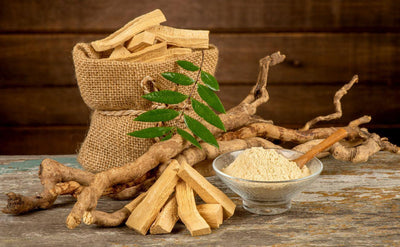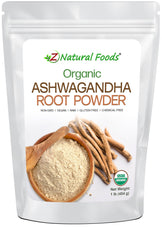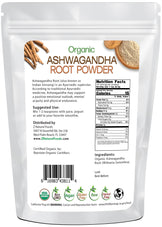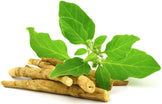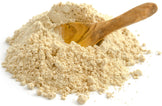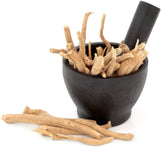Description
Description
1. What is Ashwagandha?
Ashwagandha (Withania somnifera) has long been revered for its healing and therapeutic properties. A potent ancient herb, ashwagandha is considered a staple in many cultures for its incredible healing powers.
Dating back thousands of years, ashwagandha (pronounced: ash-wa-gan-da) has been a prominent part of the TCM (Traditional Chinese Medicine), Ayurvedic, and Siddha systems of Indian medicine (1).
2. Where does Ashwagandha come from?
A small evergreen shrub native to Tibet, China, Nepal, and other Asian countries (1)(2), ashwagandha originally came to the West from India. The rather average-looking plant has velvety leaves, small white flowers, and orange-red berries similar to tomatoes.
3. How does Ashwagandha work?
Ashwagandha is one of the most potent herbs in modern and traditional holistic medicine. It’s not the leaves nor the berries but the plant’s root that is the source of ashwagandha’s healing power because it contains numerous phytochemicals that balance many systems in the body.
4. What does Ashwagandha mean?
Ashwagandha means “smell of horse.” It got this unique name not only because the fresh root has a horse-like odor, but ashwagandha is known as “Indian Ginseng" (although not stimulating like red ginseng specifically).
Ashwagandha is also said to make you “strong as a horse.”
5. Is Ashwagandha an adaptogen herb?
Yes! The 3 most important criteria of adaptogens are that they must:
- Be nontoxic
- Increase the resistance of the hormonal and immune systems to ALL kinds of stressors through a nonspecific physiological response.
- Normalize body function NO MATTER how external stressors have altered them.
As Ashwagandha does, if an herb fills the above criteria, they are a “true” adaptogen.
6. Who should take ashwagandha?
In the case of Ashwagandha, while almost anyone will see a positive benefit, those with very aggressive personalities who need help to “bring it down a notch” seem to respond very well as the effects are seen relatively quickly. Here is an important fact to keep in mind:
Regardless of our personalities, we ALL have moments of feeling “out of control,” and this is where Ashwagandha can be a godsend for both short-term and long-term use.
7. What does Ashwagandha do?
This magical herb is often considered to be nature’s gift to humanity. Traditionally it has been used to treat everything from stress and anxiety to serious diseases, including smallpox, typhoid, and even high blood pressure. (1)(2)
For thousands of years, natural healers have claimed this ancient herb can fight off nearly everything that harms your health! (1)(2) This may be primarily because of its unique ability to calm the body and mind revealing one of its most important powers: Healing the body through deep sleep.
8. What are the benefits of Ashwagandha?
Ashwagandha is said to promote youth and longevity and alleviate many types of physical and mental suffering. In Ayurveda, ashwagandha was administered to children and the elderly to imbue them with energy and relieve pain, inflammation, and nervous debility. It’s been a staple of Ayurvedic medicine because it has various possible benefits such as stress and anxiety relief, possible blood sugar control, may protect from Alzheimer’s disease and memory loss, supporting increased muscle mass and strength, heart health, and even increasing stamina and endurance.
9. How Long Does It Take for Ashwagandha to Work?
Like many herbal supplements, you may need to take the herb for approximately three to six weeks to get the full effect.
While you may notice minor changes over the first few days, it will take time for your body to begin to utilize all of the properties associated with the herb. If you are trying to gain the maximum benefits from an herbal supplement, it's important to take it consistently every day.
Daily use of Ashwagandha is the best way to get the benefits.
10. How Much Ashwagandha Powder Should I Take?
If you are taking whole Ashwagandha root in powdered form, it is recommended that you take approximately one teaspoon two times a day. It can be divided into quarter doses and added to beverages, puddings, yogurt, or other soft foods.
Taking Ashwagandha in powdered form is one of the best ways to benefit. Powdered Ashwagandha can be included in individualized treatment plans for many mental or physical illnesses and diseases, whether mixed in water or food. Your overall weight, general health, and the use of other medications will determine your dosage.
11. Should Ashwagandha Be Taken On An Empty Stomach?
Most practitioners recommend taking Ashwagandha on an empty stomach. Consuming the herb with a full glass of water on an empty stomach allows it to be broken down and absorbed as quickly and efficiently as possible.
Consuming Ashwagandha powder with a small amount of food may alleviate any stomach discomfort, but it will slow down the digestive process.
For Bulk inquiries and custom formulations click here: https://www.znaturalfoods.com/pages/bulk
References
- Singh, Narendra, et al. "An overview on ashwagandha: a Rasayana (rejuvenator) of Ayurveda." African Journal of Traditional, Complementary and Alternative Medicines 8.5 (2011).
- Mirjalili, Mohammad Hossein, et al. "Steroidal lactones from Withania somnifera, an ancient plant for novel medicine." Molecules 14.7 (2009): 2373-2393.


